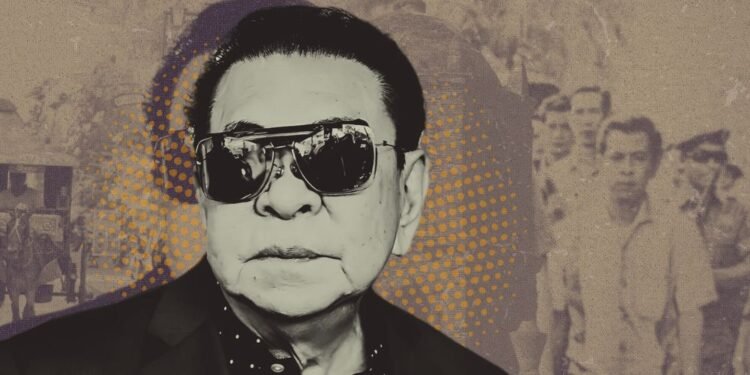It all started with a tiger.
Or at least, that’s how most Filipinos remember the Singson name—Chavit posing next to exotic animals in Baluarte Zoo or flashing his signature grin while trading barbs in the political ring.
But what most don’t know is that behind that image lies a dynasty built like a fortress. Part political juggernaut, part business empire, and part spectacle, the Singson family turned their turf in Ilocos Sur into a personal stronghold.
Long before “Chavit” became a household name, the Singsons were already embedded in Vigan’s fabric.
Their legacy dates back to 18th-century Spanish-Chinese mestizo traders, evolving over centuries into one of Northern Luzon’s most tightly woven clans. In a region where family names mean everything, theirs was always on the ballot—and the deed of sale.
The bloodline that became a brand
Luis “Chavit” Singson wasn’t the first Singson in politics, but he was the one who turned the family into a brand.
His father, José Singson Sr., was mayor of Vigan. His brother Evaristo and other relatives dominated nearby towns. By the ’70s, the Singsons were the de facto ruling family of Ilocos Sur.
But Chavit wasn’t content with just winning elections—he wanted spectacle. His style blurred the line between warlord and showman.
From paramilitary clashes during the Crisologo feud to wild campaigns on horseback, he embraced drama like it was part of his mandate.
And it worked. He held the governorship for decades, bouncing in and out of power with the elasticity of a rubber band and the impunity of a king.
From bullets to billions
Chavit’s real empire wasn’t just built on votes—it was built on logistics, tourism, mining, and more.
At the center is the LCS Group of Companies, which he chairs. The acronym stands for Luis Crisologo Singson, but the scope stretches far beyond one man:
- Partas Bus Company: Dominates transport in Northern Luzon. Started in 1989, still one of the biggest revenue drivers.
- Platinum Skies: A boutique charter airline operating out of NAIA.
- Satrap Mining Corporation: Active in gold, copper, and nickel mining. One of the family’s most controversial holdings.
- Legado Motors: Once the exclusive Philippine distributor for GAC (Chinese automobile brand).
- Gracia Telecoms: Singson’s push into ICT and rural connectivity.
- Baluarte Zoo: Tourism cash cow and political flex zone, once housing tigers, lions, and even a bear.
The Singsons have never publicly declared a consolidated net worth, but conservative estimates based on available filings and business revenue suggest multi-billion peso holdings.
Partas alone is valued in the hundreds of millions. Satrap and LCS’s infrastructure projects (like solar energy and port development) extend their reach across Luzon and Mindanao.
How the Singsons turned heritage into a tourism machine
Every stone in Vigan leads back to someone named Singson.
Vigan’s UNESCO status in 1999 was backed by Chavit Singson’s provincial leadership and investment in preservation. He launched Baluarte Zoo as a soft power attraction just outside the city core, while the Tourist Passport program under Mayor Bonito Singson links food, crafts, and museums to official city promos.
Meanwhile, Calle Crisologo is the most romantic street in the country.
Ilocano pride lives between the cracks of every cobblestone. Cobbled, car-free, and gaslamp-lit, it blends 18th-century architecture with Ilocano soul.
Bahay na bato homes now house antique shops, cafes, and weekend kalesa rides. No other city keeps its heritage streets this intact and this alive.
The food hits hard, the weaving runs deep, and the festivals aren’t shy.
Festivals like the World Costume Parade and Longganisa Fiesta turn tradition into spectacle. Empanada stalls, bagnet houses, and weaving demos run alongside century-old mansions. Pottery workshops at Pagburnayan offer hands-on time with clay, not just curated museum tours.
From whistleblowing to weaponizing power
One of the most pivotal chapters in the Singson saga came in 2000. Chavit accused President Joseph Estrada of receiving P400 million in jueteng payola.
The exposé led to Erap’s impeachment—proof that Chavit wasn’t just playing kingmaker in Ilocos; he was swinging the axe nationally.
But every sword has two edges.
The same man who brought down a president has dodged multiple corruption allegations himself. From casino debts to undeclared assets, Chavit’s record has sparked more questions than convictions. Yet he’s never been convicted of any major crime—a survival skill in Philippine politics.
The next generation in waiting
Chavit’s children are slowly stepping into the spotlight.
Daughter Richelle Singson manages parts of the tourism and real estate portfolio.
His son Ryan Luis Singson served as governor of Ilocos Sur and currently sits as a member of the House of Representatives.
Nephew Ronald Singson, despite a past drug conviction in Hong Kong, made a comeback and now holds a congressional seat.
The message is clear: the dynasty is succession-proof. They’ve diversified beyond politics.
From event production to digital tech, the younger Singsons are tapping new industries while holding onto the family’s traditional sources of power.
Richelle Singson’s expanding influence
Among this generation, Congresswoman Richelle Singson-Michael has carved out an especially prominent role.
As the first nominee of the Ako Ilocano Ako party-list, she has championed budget increases for health and social programs while spearheading assistance projects for transport workers, youth, and women’s livelihoods.
Outside of Congress, Richelle is CEO of Platinum Skies Aviation, leads her own architecture and real estate firm, and co-founded fintech platforms such as u-hop and casha.me. She also chaired the organizing committee of Miss Universe 2016 in the Philippines, quietly overseeing a billion-peso event that boosted tourism and Vigan’s visibility.
Her ability to balance legislation and a vast business portfolio has made her one of the most visible and capable members of the clan.
Why the Singson machine keeps running
Unlike Manila oligarchs who rely on corporate boards, the Singsons draw power from local loyalty.
Their empire is hyper-territorial, rooted in Ilocano patronage and controlled from the ground up. It’s not a boardroom—it’s a barangay meeting where every favor is remembered.
Their wealth flows in loops: transport systems feed tourism, tourism draws media attention, media keeps the brand alive.
Political capital buys regulatory space for business, and business success funds political runs. It’s less of a strategy and more of an ecosystem.
A dynasty that refuses to die
Other political families fade with age or scandal. The Singsons endure because they’ve adapted.
Chavit’s pivot from warlord to media personality, from governor to “Lion King” of Vigan, has made him more meme than man—but memes are sticky.
As the next elections approach, don’t be surprised to see more Singsons on your screen, ballot, or billboard.
Whether it’s through mining permits, beauty pageants, or birthday bashes with Manny Pacquiao, the family finds ways to stay in the room.
Their kingdom isn’t just Ilocos—it’s anywhere a contract needs signing, a bus needs rerouting, or a microphone needs holding.
The legacy no one can ignore
For all the headlines, exposés, and viral photos, one truth remains: the Singsons built something that doesn’t need permission to exist.
They run it like a clan, grow it like a business, and defend it like a fiefdom.
Their story isn’t a fairy tale—it’s a blueprint. And unless something massive shifts, the Singsons will keep rewriting the rules from the north.












